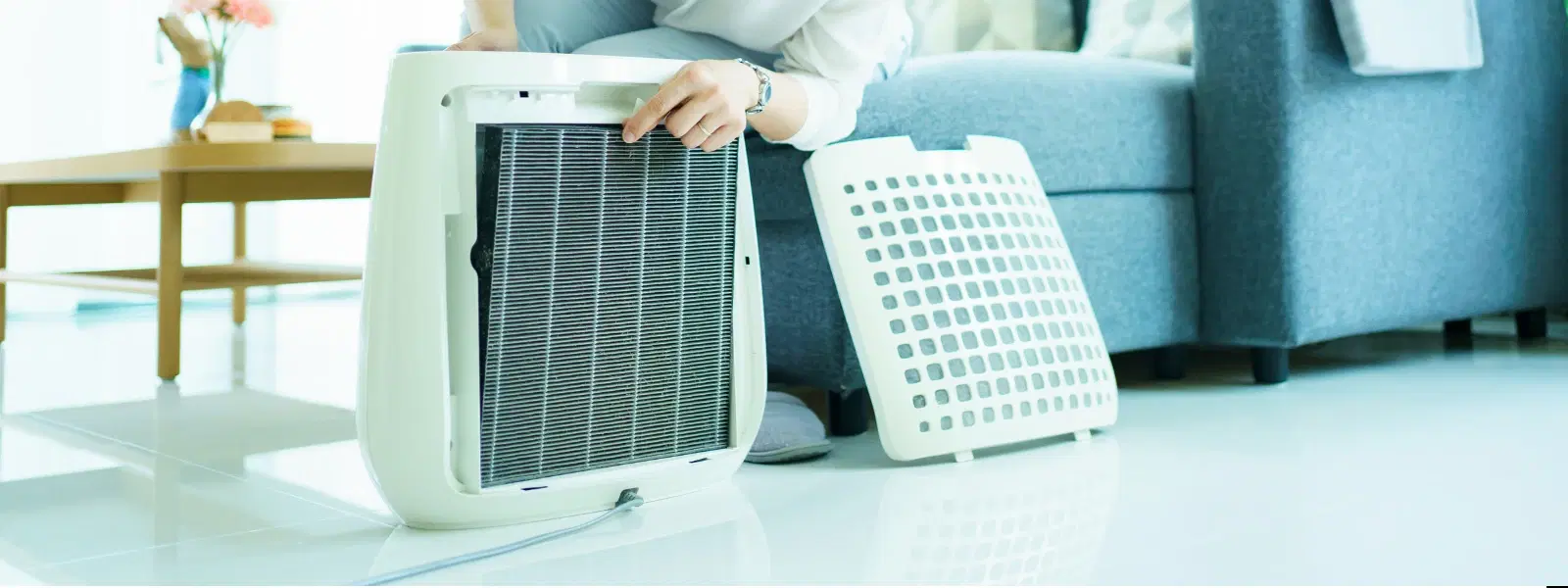
Home Appliances
•04 min read
Indoor air pollution can be 2-5 times worse than outdoor air pollution, according to a study by the Environmental Protection Agency (EPA), a fact that highlights the urgent need for clean air in our homes. Air purifiers play an essential role in enhancing indoor air quality, and the filters they use are the unsung heroes behind their effective performance. This guide offers a clear checklist to help you maintain your air purifier filters, ensuring long-lasting efficiency and a healthier living environment. Shop on Tata Neu to earn up to 5% NeuCoins with every purchase and enjoy express delivery for your home essentials.
Filters in air purifiers are designed to trap a range of inner pollutants such as dust, allergens, and odours. With various types available—including HEPA filters that capture up to 99.97% of particles as small as 0.3 microns, according to a 2024 study by XYZ, activated carbon filters that absorb volatile organic compounds (VOCs), and washable filters that offer a cost-effective solution—the right filter significantly boosts your air quality.
When filters are not maintained properly or left dirty, the air purifier's performance can diminish, potentially compromising indoor air quality. Neglected filters not only reduce the device’s effectiveness but also may expose your family to unnecessary health risks. Keeping your filter in optimal condition is paramount to enjoying a fresh and safe environment.
HEPA filters are famed for their incredible ability to trap minute particles, making them ideal for alleviating allergies and asthma-related issues. They stand out due to their efficiency in capturing diverse pollutants, thereby securing a clean breathing space at home.
These filters excel at absorbing unpleasant odours, gases, and VOCs. Their unique activated carbon composition ensures that the air you breathe is free from unwanted smells and contaminants.
For those seeking an eco-friendly alternative, washable filters are a great choice. They are designed to be maintained over time through regular rinsing and drying, making them both practical and sustainable when cared for properly.
Begin by checking whether your air purifier uses a HEPA filter, an activated carbon filter, or a washable filter. Knowing your filter type allows you to follow the appropriate maintenance schedule and cleaning procedure.
Make it a habit of inspecting your filters every 2-4 weeks. Look for any signs of visible dirt or damage to determine if a cleaning or replacement is needed.
The manufacturer’s recommendations are invaluable. Adhering to these instructions is key, whether it’s about cleaning methods or replacing filters at specified intervals.
If your air purifier features a washable filter, ensure you clean it thoroughly. Start by removing the filter, gently rinsing it with water, and allowing it to dry completely before reinstalling to maintain peak performance.
For non-washable options such as HEPA and activated carbon filters, stick to a replacement timeline—typically every 6-12 months. For optimal performance, always replace your air purifier replacement filter within the recommended timeline. Timely replacement is crucial for continuous effective filtration and maintaining a healthy indoor atmosphere.
Dust and dirt can quickly accumulate around your air purifier, compromising its efficiency. Keeping the surrounding area clean reduces the risk of overwhelming your filter, thereby extending its service life.
Using a home air quality monitor (AQI) can provide insights into the effectiveness of your air purifier. Regular monitoring helps you determine when a filter might need attention, ultimately ensuring a consistently fresh indoor environment.
If you keep spare filters, store them in a dry, dust-free environment. Careful storage preserves the quality of the filters until they are needed, protecting your investment in clean air.
High levels of pollutants can overload filters, reducing their lifespan. Ensure that you manage indoor pollutant sources, allowing your air purifier to function optimally without excessive strain.
Premium filters often provide a longer lifespan and consistent performance. By choosing high-quality, long-lasting filters, you reduce the frequency of replacements and enjoy efficient air cleaning throughout their extended service period.
Regularly vacuuming the pre-filter in your air purifier can extend the life of HEPA and activated carbon filters by reducing the load of larger particles. This simple step can save you money on replacements and ensure cleaner air for longer.
Yes, air purifiers effectively remove pollutants, allergens, and odours when their filters are properly maintained and replaced as recommended.
Only washable filters can be cleaned; HEPA and activated carbon filters require replacement as per the manufacturer’s guidance.
Absolutely, filters are the core of air purifiers, actively trapping and eliminating contaminants to ensure cleaner indoor air.
Most filters are designed for replacement every 6-12 months, although this can vary according to usage and indoor air quality conditions. Always refer to the manufacturer’s guidelines for specific timelines.
In summary, maintaining your air purifier filters is essential for keeping your indoor air fresh and healthy. By following this detailed checklist—from identifying your filter type and inspecting it regularly, to cleaning or replacing it as needed—you can ensure that your air purifier performs at its best. Moreover, consistent upkeep not only provides healthier air but also preserves your investment in a long-lasting, efficient filter system. Enjoy the peace of mind that comes with a clean environment, and remember that these small steps go a long way in protecting the health and well-being of your loved ones. Shop on Tata Neu to earn up to 5% NeuCoins with every purchase and enjoy express delivery for your home essentials.